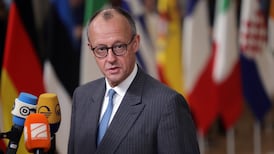Chancellor Angela Merkel will meet her Bavarian allies on Monday afternoon in a last attempt to find agreement on migration policy and avoid rupture in their centre-right alliance after almost seven decades.
The stand-off, which threatens Dr Merkel's fourth-term coalition, escalated on Sunday after an emotional eight-hour crisis meeting of the Christian Social Union (CSU) in Munich.
Its leader Horst Seehofer, who is also interior minister in Berlin, offered to stand aside amid CSU disagreement on whether last week's EU political proposals on asylum seekers were sufficiently strong to avoid German border closures.
"I said I would make both positions available in the next three days," Mr Seehofe said on Monday morning, ahead of final talks with the chancellor. "We want an attempt at agreement in the interests of this government."
In the CSU's larger sister party, Dr Merkel's own Christian Democratic Union (CDU), the resignation threats from Munich appear to have solidified support behind the chancellor.
"We have done everything to build bridges and we will do everything to ensure the CDU/CSU union stays together," Mr Peter Altmaier said, federal economics minister and a close Merkel ally.
But the CSU leader's resignation threat has darkened further the mood between the two parties, who have shared a parliamentary party in the Bundestag for 69 years.
From today Mr Seehofer had vowed to turn back at German borders migrants already refused asylum or registered elsewhere in the EU - unless Dr Merkel could convince European leaders to sign up to “equivalent” measures to reduce asylum numbers.
The chancellor returned from last week’s all-night summit agreement convinced she had a deal to appease the CSU, but her hopes of ending her coalition crisis evaporated in a long weekend of closed-door meetings and megaphone diplomacy.
“The situation is serious, everyone knows that,” Dr Merkel said in a German television interview on Sunday evening.
She repeated a concern of EU leaders that unilateral measures could endanger the Schengen free-travel area and warned her Bavarian allies against "uncoordinated, unilateral measures in Europe at the expense of" other member states.
“Europe works slowly,” she said. “I am in favour of Europe remaining together.”
Acknowledging her political career hung in the balance, Dr Merkel reportedly told political allies a CSU refusal to accept last week’s summit conclusion would mean “I don’t need to show my face again in Europe”.
After an all-night marathon, EU leaders reached political agreement on Friday to step up controls on the EU outer border and bring migrants to central processing camps inside and outside the EU.
In addition, Berlin struck bilateral agreements with Greece, Spain and a reported dozen others to send back from Germany asylum seekers already registered there.
After conciliatory signals on Friday senior CSU officials said on Sunday that, on closer inspection, the agreement was filled with “contradictory small steps”.
“The meeting was very dramatic,” Mr Hans-Peter Friedrich said, a CSU executive board meeting on Monday morning. “There was clear support for Mr Seehofer, the CSU has decided in this question, there must be refusal of entry [for asylum seekers].”
The CDU and CSU sister parties have wrestled on Dr Merkel’s liberal refugee policy since Germany accepted over 1.4 million people in 2015 and 2016.
Germany has tightened up its asylum procedures since then and new arrivals have fallen dramatically. But political observers suggest the CSU is looking for a symbolic tightening of border rules to salvage its law-and-order profile, and endangered absolute majority, when Bavarians choose a new state parliament in October.
If Mr Seehofer - or a successor - goes against Dr Merkel’s wishes she is likely to fire him, triggering a walkout of CSU ministers in the Berlin and a likely rupture of the CDU/CSU parliamentary party alliance and Dr Merkel’s coalition.
Asked if she would discipline her rebellious coalition partner with a Bundestag confidence motion, Dr Merkel replied: “We’ll see.”
On Sunday evening, Dr Merkel appeared to concede her response to the refugee crisis had given a political boost to the far-right Alternative für Deutschland (AfD).
“Perhaps there is sometimes a yearning for simple answers,” she said,” and that without Merkel there would be no migration problem.”














